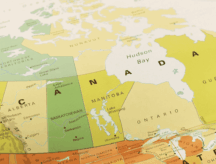Experts are telling Canadian residents to expect warmer winters in some parts of the country this year
Meteorologists say that a warm weather phenomenon, known as El Nino, is expected to have a varying impact on temperatures and weather patterns around Canada this winter.
El Nino is a weather pattern that causes “warm water [to be] pushed back east, toward the west coast of the Americas”. This is according to the United States National Oceanic and Atmospheric Administration (NOAA).
Ahead of the winter season this year, experts say that El Nino will occur in a manner that is expected to have a significant impact on the wintertime weather in Canada. However, the specific impact you feel from El Nino will depend on what part of Canada you live in (more on that later).
What can Canada expect from El Nino in 2023?
According to a report from The Weather Network published on November 29, El Nino typically brings milder winters to many regions across the country. However, mild winters cannot be expected broadly across Canada this year.
Discover if You Are Eligible for Canadian Immigration
Instead, as this year’s winter season is expected to “feature one of the strongest El Niño events on record”, experts say most residents of this country will not experience “consistently cold temperatures until later in the [winter]”. This means that “relative to this time of year”, the weather during “the core of winter, [from] December to February, will begin mildly.”
Why some experts say the effects of El Nino will be different this year
The key to El Nino’s effect, says the report, is the absence of “consistently” cold weather. This pattern, typified by near- to above-normal temperatures, can be expected to continue well into December across most of Canada, according to the report.
However, while the typical effects of El Nino mean that mild weather patterns should be the experience for most people across this country this winter, this year may be different, says The Weather Network’s report.
Instead of broadly mild winters across the country, Western Canada should see El Nino impact the weather as usual while the “eastern half” of Canada may experience something unexpected.
“From the eastern Prairies to Atlantic Canada”, the report says that winter may even be more severe than usual this year, especially in January and February.
How can I expect El Nino to impact my province or territory?
The following will provide a general breakdown of how the recent report from The Weather Network expects El Nino to impact all 13 provinces and territories in Canada this year.
Note: Click here for the full breakdown, which includes comments on how El Nino is expected to impact certain cities within each region
British Columbia (BC)
In BC, Canada’s westernmost province, experts say that residents can largely expect above-normal temperatures this winter.
Compared to typical weather patterns in this province during the winter, other expected effects of El Nino in BC this year include:
- Below-normal levels of rain
- Below-normal snowfall
- More sunshine
Alberta
Residents of Alberta can expect a relatively mild winter, characterized by “above-normal temperatures and below-normal [levels of] snow.” The weather in this province is also expected to result in a “relatively mild and dry pattern during the weeks leading up to Christmas.”
Note: Projections of milder winter weather do not mean any region of Canada will not potentially experience periods of typical winter weather
Due to the potential of a “mid- to late-winter … cold pattern” east of the province, projections say that Alberta may experience more severe winter weather, including more snow, this season. The report says that this would happen, typified by “periods of more significant cold weather”, if the currently projected “cold weather shifts further west than [expected].”
Saskatchewan and Manitoba
Here is what effects are expected due to the impacts of El Nino in these two prairie provinces:
- A milder-than-normal winter with less persistent (than normal) periods of severe cold
- A white Christmas for most residents of these provinces, although with a slight risk of this being affected by a pattern of mild and dry weather leading up to the holiday
- Below-normal snowfall across western Saskatchewan
- Near-normal snow in eastern Saskatchewan and Manitoba
Quebec
Quebec can expect a generally mild start to winter, especially in the western parts of the province. “Around the holidays”, says the report however, there are “indications of a more wintry pattern developing”. This would mean more snow in Quebec around Christmas.
Current projections bear out that the province is also likely to move into a pattern of colder weather quickly in January, which is atypical compared to the usual effects of El Nino.
Ontario
Residents of Ontario should see a mild start to winter, meaning below-normal levels of snow leading up to Christmas and the New Year.
Current projections also suggest that Ontario will see a more typical pattern of wintertime weather “around the holidays” and, much like Quebec, a colder pattern of weather in January. Again, it is worth noting that this is atypical compared to the usual effects of El Nino.
Nova Scotia, New Brunswick, and Prince Edward Island
In these three Atlantic Canadian provinces, despite El Nino, a “near-normal” winter is expected. This means that there will likely be periods of mild weather and contrasting periods of cold weather in this region.
Specifically, the following describes how El Nino is expected to impact this part of Canada during the coming winter months:
- Near-normal or slightly above-normal snow
- Near-normal or slightly above-normal rain
Newfoundland & Labrador (NL)
The impacts of El Nino are expected to fluctuate in NL. This is similar to how El Nino is expected to impact Canada’s other Atlantic provinces (see above). This means that NL will see milder weather at some times and colder weather at others. Therefore, the report says that this region of Canada will ultimately have a near-normal winter for this province’s standards. This will include near-normal levels of rain in the region.
Yukon, Northwest Territories and Nunavut
In Canada’s three territories, El Nino is expected to result in milder-than-normal temperatures across most of the region.
Despite this projection, it is also noted that a cold start to the winter season in Alaska could impact the weather in Yukon, Canada’s westernmost territory. In addition, the effects of the polar may bring a period of abnormally cold temperatures to some parts of this Canadian region.
- Do you need Canadian immigration assistance? Contact the Contact Cohen Immigration Law firm by completing our form
- Send us your feedback or your non-legal assistance questions by emailing us at media@canadavisa.com







